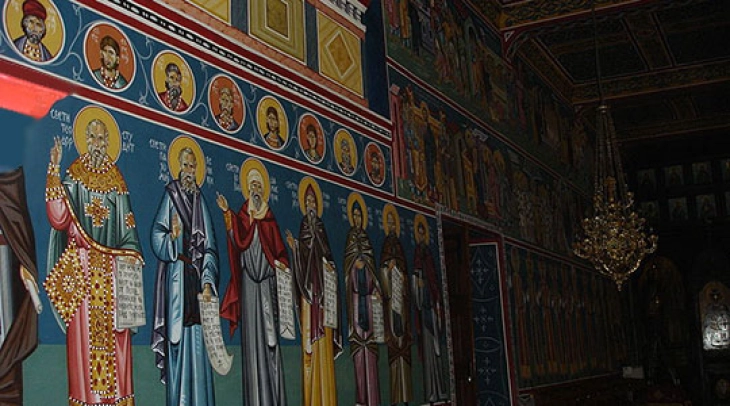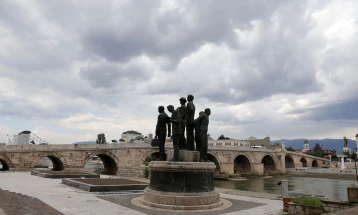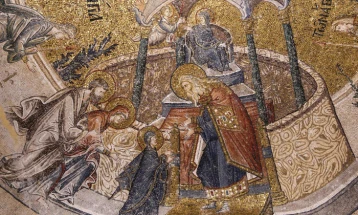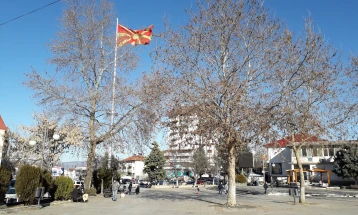
27 October 2022 (MIA)
Macedonian Orthodox Church Calendar
Our Holy Mother Petka (Paraskeva) This glorious saint was of Serbian birth, from the town of Epibata, between Silinaurius and Constantinople. St Petka’s parents were wealthy and devout Christians, and had one son, Euthymius, who became a monk during his parents’ lifetime and later became Bishop of Madytos. After her parents’ death, the maiden Petka, always desirous of the ascetic life for the sake of Christ, left her home and went first to Constantinople and then to the Jordan wilderness, where she lived to old age in asceticism. Who can describe all the labours, the sufferings, the temptations from demons that Petka endured for many years? In her old age, an angel of God appeared to her and said: ‘Leave the wilderness and go back to your home.’ St Petka obeyed the voice from heaven, left her beloved wilderness and returned to Epibata. She lived a further two years there, still in ceaseless fasting and prayer, and then gave her spirit into God’s hands and went to join the company of Paradise. She entered into rest in the eleventh century. Her wonderworking relics were, in the course of time, taken to Constantinople, Trnovo, Constantinople again and Belgrade. They are now in Romania, in the town of Jassy. St Petka’s spring is to be found in Belgrade. The waters miraculously heal all the sick who, with faith in God and love for this saint, hasten to ask her aid. Catholic Calendar St. Vincent Deacon of Saragossa, and martyr under Diocletian, 304; mentioned in the Roman Martyrology, 22 Jan., with St. Anastasius the Persian, honoured by the Greeks, 11 Nov. This most renowned martyr of Spain is represented in the dalmatic of a deacon, and has as emblems a cross, a raven, a grate, or a fire-pile. He is honoured as patron in Valencia, Saragossa, Portugal etc., is invoked by vintners, brickmakers, and sailors, and is in the Litany of the Saints. His Acts were read in the churches of Africa at the end of the fourth century, as St. Augustine testifies in Sermon 275. The present Acts (Acta SS., III Jan., 6) date from the eighth or ninth century, and were compiled from tradition. Anal. Boll., I, 259, gives another life. All agree in substance with the metric life by Prudentius (P.L., LX, 378). He was born at Saragossa; his father was Eutricius (Euthicius), and his mother, Enola, a native of Osca. Under the direction of Valerius, Bishop of Sargossa, Vincent made great progress in his studies. He was ordained deacon and commissioned to do the preaching in the diocese, the bishop having an impediment of speech. By order of the Governor Dacian he and his bishop were dragged in chains to Valencia and kept in prison for a long time. Then Valerius was banished, but Vincent was subjected to many cruel torments, the rack, the gridiron, and scourging. He was again imprisoned, in a cell strewn with potsherds. He was next placed in a soft and luxurious bed, to shake his constancy, but here he expired. His body was thrown to be devoured by vultures, but it was defended by a raven. Dacian had the body cast into the sea, but it came to shore and was buried by a pious widow. After peace was restored to the Church, a chapel was built over the remains outside the walls of Valencia. In 1175 the relics were brought to Lisbon; others claim that they came to Castres in 864. Cremona, Bari, and other cities claim to have relics. Childeric I brought the sole and dalmatic to Paris in 542, and built a church in honour of St. Vincent, later called St-Germain-des-Prés. Regimont, near Bezières, had a church of the saint as early as 455. Rome had three churches dedicated to St. Vincent; one near St. Peter’s, another in Trastevere, and the one built by Honorius I (625-38) and renewed by Leo III in 796. A pilaster found in the basilica of Salona in Dalmatia shows an inscription of the fifth or sixth century in honour of the saint (Rom. Quartalschrift, 1907, Arch. 135).
Our Holy Mother Petka (Paraskeva) This glorious saint was of Serbian birth, from the town of Epibata, between Silinaurius and Constantinople. St Petka’s parents were wealthy and devout Christians, and had one son, Euthymius, who became a monk during his parents’ lifetime and later became Bishop of Madytos. After her parents’ death, the maiden Petka, always desirous of the ascetic life for the sake of Christ, left her home and went first to Constantinople and then to the Jordan wilderness, where she lived to old age in asceticism. Who can describe all the labours, the sufferings, the temptations from demons that Petka endured for many years? In her old age, an angel of God appeared to her and said: ‘Leave the wilderness and go back to your home.’ St Petka obeyed the voice from heaven, left her beloved wilderness and returned to Epibata. She lived a further two years there, still in ceaseless fasting and prayer, and then gave her spirit into God’s hands and went to join the company of Paradise. She entered into rest in the eleventh century. Her wonderworking relics were, in the course of time, taken to Constantinople, Trnovo, Constantinople again and Belgrade. They are now in Romania, in the town of Jassy. St Petka’s spring is to be found in Belgrade. The waters miraculously heal all the sick who, with faith in God and love for this saint, hasten to ask her aid. Catholic Calendar St. Vincent Deacon of Saragossa, and martyr under Diocletian, 304; mentioned in the Roman Martyrology, 22 Jan., with St. Anastasius the Persian, honoured by the Greeks, 11 Nov. This most renowned martyr of Spain is represented in the dalmatic of a deacon, and has as emblems a cross, a raven, a grate, or a fire-pile. He is honoured as patron in Valencia, Saragossa, Portugal etc., is invoked by vintners, brickmakers, and sailors, and is in the Litany of the Saints. His Acts were read in the churches of Africa at the end of the fourth century, as St. Augustine testifies in Sermon 275. The present Acts (Acta SS., III Jan., 6) date from the eighth or ninth century, and were compiled from tradition. Anal. Boll., I, 259, gives another life. All agree in substance with the metric life by Prudentius (P.L., LX, 378). He was born at Saragossa; his father was Eutricius (Euthicius), and his mother, Enola, a native of Osca. Under the direction of Valerius, Bishop of Sargossa, Vincent made great progress in his studies. He was ordained deacon and commissioned to do the preaching in the diocese, the bishop having an impediment of speech. By order of the Governor Dacian he and his bishop were dragged in chains to Valencia and kept in prison for a long time. Then Valerius was banished, but Vincent was subjected to many cruel torments, the rack, the gridiron, and scourging. He was again imprisoned, in a cell strewn with potsherds. He was next placed in a soft and luxurious bed, to shake his constancy, but here he expired. His body was thrown to be devoured by vultures, but it was defended by a raven. Dacian had the body cast into the sea, but it came to shore and was buried by a pious widow. After peace was restored to the Church, a chapel was built over the remains outside the walls of Valencia. In 1175 the relics were brought to Lisbon; others claim that they came to Castres in 864. Cremona, Bari, and other cities claim to have relics. Childeric I brought the sole and dalmatic to Paris in 542, and built a church in honour of St. Vincent, later called St-Germain-des-Prés. Regimont, near Bezières, had a church of the saint as early as 455. Rome had three churches dedicated to St. Vincent; one near St. Peter’s, another in Trastevere, and the one built by Honorius I (625-38) and renewed by Leo III in 796. A pilaster found in the basilica of Salona in Dalmatia shows an inscription of the fifth or sixth century in honour of the saint (Rom. Quartalschrift, 1907, Arch. 135).







